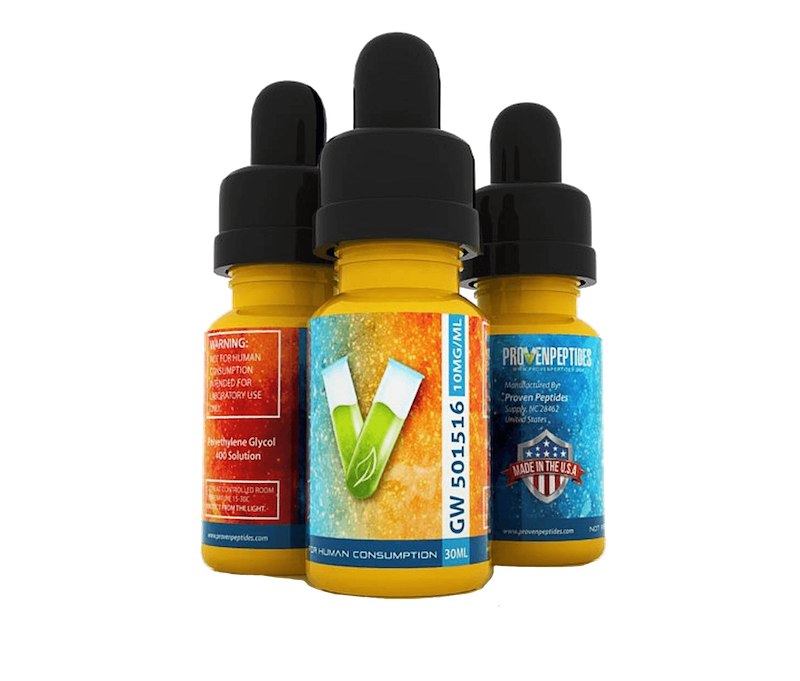Cardarine is a research compound that was being researched for its potential to increase metabolism and fat burning, stop obesity, and increase muscle development, but its side effects and risks tend to be dangerously downplayed. In fact, studies were stopped since it was found to induce cancer! Learn all about GW501616, exactly what its proponents use it for, why it is prohibited from sanctioned sports, and why it’s so dangerous and must be avoided.
Disclaimer: Cardarine is illegal, its supposed”advantages” are unproven, and it was demonstrated to cause cancer as part of regular research before progressing through clinical trials. Don’t under any conditions take this compound. We cannot stress that enough. A number of our readers who were already taking the drug requested we commission a post on it, and we are simply providing information that’s offered from the scientific and clinical literature.
What Is Cardarine?
Controversial Drug
Cardarine was developed by GlaxoSmithKline for its possible gains in the heart, blood vessels, and diabetes. But, research was halted in Stage II on animals because it induced cancers.

Some of the margarine’s proponents argue that cancer risks have not been shown in humans, but this is because it was not discovered secure enough to warrant long-term security studies in people. In reality, most carcinogenic substances typically don’t cause cancer in these types of animal research since they’re not sensitive enough to pick up chemicals that just marginally increase the chance of developing cancer. They are made to pick up on the most peculiar substances so we do not hazard the lives of individual subjects in early clinical work.
We can’t stress this enough: Cardamine has been demonstrated to induce cancer, period!
But how did scientists discover margarine (less elegantly known as GW501516) in the first location?
It’s no secret that the contemporary inactive lifestyle leads to many metabolic issues, like diabetes, inflammation, and heart disease. In the quest for materials that could speed up fat burning and improve physical endurance in sedentary adults, scientists switched into the PPAR-delta pathway.
Activation of PPAR-delta is associated with increased energy, fat burning, muscle building, and endurance and decreased lipids from the blood. Cardarine binds to and activates the peroxisome proliferator activator receptor delta (PPAR-delta). A good deal of PPAR-delta is at the muscles, and it triggers many genes important for energy use.
Activating PPAR-delta could play a role in building muscles, improving cardiovascular health, boosting metabolism, and reducing inflammation. Targeting this pathway with Cardarine seems promising. But investigators refer to Cardarine as a failed”exercise mimetic,” because it caused cancer in animal research.
According to a lot of researchers, there are natural and safe techniques to trigger PPAR-delta, such as endurance exercise and sunlight exposure. Some studies have also indicated that berberine could be a milder and safer PPAR-delta-activating supplement.
Scientists discovered margarine whilst looking for a compound that boosted fat burning and exercise performance, but they halted the research due to the fact it may cause cancer.
Snapshot
Proponents:
- May shield the mind and blood vessels
- Might boost fat burning and bodily performance
- May enhance lipid profile and insulin sensitivity
Skeptics:
- Banned as a result of cancer-causing effects in animals
- It triggers cancer!!!!!
- Not well studied in humans
- May harm the liver and also worsen liver disease
- May impair endothelial growth
- Beyond dangerous
- Might cause brain damage!
Is Cardarine Legal?
Cardarine isn’t legal, nor is it approved for use in humans.
As its unwanted side effects are downplayed across the internet and various forums, margarine has gained popularity for bodybuilding and performance enhancement in athletes. With a rise in popularity, Cardarine/GW501516/Endurobol is currently broadly available on the black market and as a study material.
The World Anti-Doping Agency issued a rare warning about its toxicity to athletes. The agency took an extra step to warn”cheats” this material can be very dangerous, increasing awareness about its health dangers.
Cardarine is popular among bodybuilders despite not being legal or approved for use in people. Organizations such as the World Anti-Doping Agency have issued warnings regarding its blatant toxicity.
Can Be Cardarine a SARM?
Cardarine is not a SARM, that stands for selective androgen receptor modulators. SARMs trigger the androgen receptors in certain tissues like bone and muscle, which increases muscle mass. They were developed in the 40s to mimic testosterone.
Cardarine, on the other hand, is a PPAR-delta activator. It doesn’t act directly on androgen receptors.
Tests of Cardarine
1) Brain
In one of those early animal studies on Cardarine, treated mice seemed to possess better blood flow in the brain and reduced oxidative stress.
But, Cardarine had equally pro- and anti-inflammatory effects on inflamed rat brain cells. Some inflammatory chemicals (like TNF-alpha) were decreased in its own existence, while others, such as IL-6, were increased. High IL-6 can cause brain cell damage.
Based on animal trials, Cardarine can protect brain cells from oxidative stress. But, in addition, it has the potential to harm brain cells because of inflammation.
2) Fat Burning
Cardarine was initially researched for this indication. PPAR-delta activates a number of enzymes involved in burning fat and increasing energy usage.
Recently, several human research shed new light on its own fat-burning benefits.
In an extremely compact study of 13 guys with higher belly fat and a bad cholesterol profile, those who received 2.5 mg of Cardarine each day for 6 months had decreased triglycerides, fatty acids, and VLDL proteins (apoB fractions).
Cardarine was correlated with increased HDL cholesterol in 2 studies of 305 patients with low HDL. Patients who obtained Cardarine had reduced LDL, triglycerides, and apoB.
In another small study of 12 inactive volunteers, Cardarine increased HDL. Those who received carnitine burnt more fats as an energy supply and had improved the activity of fat-burning and carnitine genes (ABCA1 and CPT1).
Cardarine may promote fat burning and also lower blood glucose, but the available evidence is considered to be of very low quality, especially given the possible risks.
3) Fat
In 6 overweight volunteers, margarine was correlated with decreased symptoms of metabolic syndrome. Participants’ liver decreased by 20 percent, insulin decreased by 11%, and blood fats decreased by 23-30percent (triglycerides by 30%, VLDL APOB by 26 percent, LDL by 23%).
Similarly, in obese monkeys, those getting Cardarine had greater HDL cholesterol and reduced triglycerides, insulin, also LDL cholesterol.
Also, mice awarded Cardarine released less glucose in the liver and became more sensitive to insulin. If this effect could be shown out in people, it might be helpful for obesity and type II diabetes.
Additionally in mice, Cardarine was linked to greater development of muscle fibers.
Cardarine was initially under investigation for preventing obesity by improving insulin sensitivity, raising fat-burning, and reducing blood lipids.
4) Heart and Blood Vessels
Besides lowering cholesterol, Cardarine may have a direct effect on blood vessels.
Cardarine prevented oxidative damage to blood vessels. It might lessen the risk of plaque buildup in the arteries by fostering blood and protective vessel-relaxing nitric oxide.
Low doses of Cardarine decreased tissue damage and inflammation in the arteries of mice. It could help clear up the blood vessels, such as reducing heart disease complications and risk.
Cardarine increased the growth of new blood vessels in human heart cells (raising VEGF). This could be good for anyone with heart disease, but could also be problematic if excessive. By way of instance, people prone to cancer should avoid taking substances like Cardarine that increase new blood vessels.
According to animal and cell studies, Cardarine can stimulate the growth of blood vessels and safeguard them against oxidative stress and inflammation.
5) Kidneys
In mice, Cardarine was linked to decreased kidney inflammation, leading the authors to indicate a possible role in protecting against kidney disease. Treated mice also experienced a decrease in the activity of genes associated with kidney disease (MCP-1).
6) Anti-inflammatory and Antioxidant
In general, PPAR-delta activation appears to curb inflammation.
By triggering PPAR-delta, Cardarine can decrease liver inflammation in animals. Some researchers have concluded that it blocks compounds involved in inflammatory responses and reduces the activity of inflammatory genes. In rats, Cardarine intake was associated with low inflammatory markers including MCP-1, TNF-alpha, IL-6, and NFκB.
Applied on the epidermis, Cardarine was correlated with improved recovery of diabetic wounds in mice, possibly due to decreased inflammation.
Cardarine may also have antioxidant possible: mice given Cardarine produced more of the antioxidant enzymes SOD1 and catalase.
Cardarine was associated with lower inflammation, decreased cognitive impairment, and enhanced wound healing in animal trials. Human studies haven’t yet been conducted and won’t be conducted since this compound is way too dangerous to test humans.
7) Liver Damage
One of the main targets of Cardarine is the liver, as the liver is vital for storing, burning, and releasing fats to the body. PPAR-delta causes the liver to change its energy supply from glucose to fatty acids, thus decreasing blood glucose.
In cell and mouse studies, margarine has shown the capability to be advantageous to liver health. Cells exposed to Cardarine generated less IL-6, which may help prevent insulin resistance. Mice were given Cardarine endured less liver damage in the high-fructose diet plan and have been less likely to create nonalcoholic fatty liver disease.
However, Cardarine caused cell death in liver cells and liver damage (fibrosis) in some mice with liver disease, further underlining the dangers related to this compound.
Cardarine has been considered to prevent liver damage by stimulating fat-burning, enhancing insulin resistance, and relieving inflammation. But, it might also worsen liver disease and was found to induce liver cell death and liver damage, further demonstrating how harmful it is.
8) Muscle Growth and Stamina
In 1 study, the regeneration of PPAR-delta through Cardarine drove the evolution of muscle fibers. These muscle fibers were associated with increased physical performance: the treated mice had improved endurance and could run for nearly two times as long.

9) Skin Disorders
Limited research suggests that regeneration of PPAR-delta could improve the inflammation caused by skin diseases like psoriasis. Cardarine was also linked to decreased inflammation in human skin cells. Bear in mind, however, that there are no approved Cardarine goods, let alone Cardarine creams.
10) Blood Flow and Wound Healing
Some researchers have indicated a role for margarine in enhancing blood flow and wound healing. In mice, Cardarine (and, by association, PPAR-delta activation) is correlated with increased levels of blood-vessel calming nitric oxide (through BH4). Nitric oxide helps enhance blood circulation and boosts wound healing.
Utilization & Possible Dangers
In clinical trials, doses of 2.5 to 10 mg/day were used for as much as 12 weeks. As this drug was not officially approved, and research was halted due to cancer risks, there is no suitable dose. Cardarine is not thought to be safe in almost any amount.
Cardarine increased cell death in liver cells and caused liver damage in some mice with liver disorder. Animal studies revealed that Cardarine can cause cancer. There are not enough human studies to show exactly the same effect, but adequate human safety studies won’t ever be undertaken because of the apparent risks of this chemical. Rapid cancer growth in many organs in animals was also the most important reason GSK abandoned the growth of the drug in 2007.
In animals, Cardarine wasn’t safe to use during pregnancy because substantial doses over an extended period of time posed risks to fetal development.
Have in mind that online forums and blogs often reread the negative effects and present only a small portion of the information. There’s a large body of evidence demonstrating that Cardarine is very dangerous!
Cardarine caused rapid cancer development in animal trials, which terminated additional drug development. It might also result in liver damage and impair fetal development. Internet forums and bodybuilding blogs often downplay its negative effects, but this highly dangerous compound should never be taken by human beings.
We advise speaking to a physician prior to taking any medication, particularly when shooting antipsychotic medication with limited security information. Cardarine is prohibited and widely considered unsafe because it caused multiple types of cancer in animals. Never choose this medicine for any reason! We cannot stress this enough.
Takeaway
Cardarine is a medication developed because of its capability to enhance fat-burning and physical performance. However, companies stopped the research after animal studies demonstrated that it can cause multiple kinds of cancer.
Despite security warnings, margarine is popular among bodybuilders and athletes. Users claim it promotes fat-burning, endurance, and muscle development. But animal studies indicate it may worsen liver disease and also impair fetal development.
Online retailers and forms often downplay the side effects and health risks of margarine. Because of the clear dangers related to this compound, we do not recommend taking Cardarine for any function.

